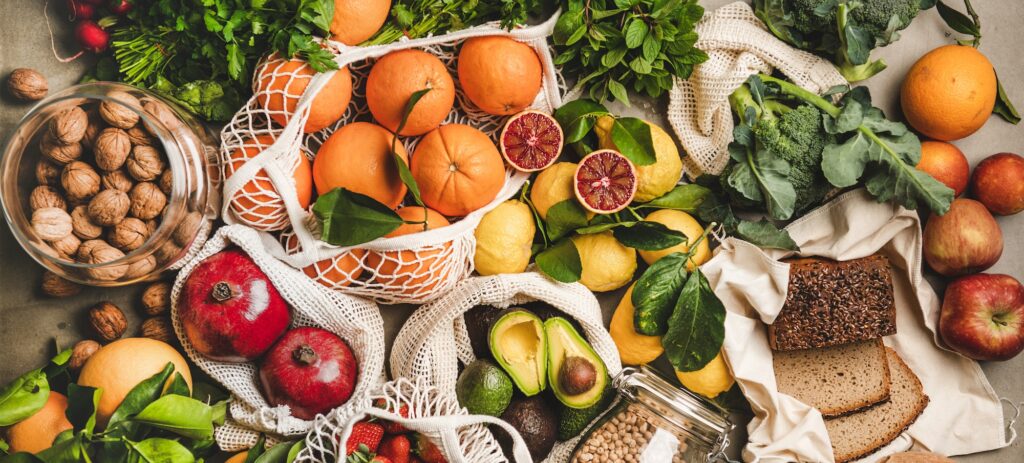Introduction:
A balanced diet is not just a buzzword; it’s a fundamental pillar of good health and vitality. The journey towards optimal well-being begins with what you put on your plate. In this blog, we’ll dive into the intricate world of a balanced diet, exploring each facet to help you make informed choices that support your health goals and lead to a happier, more energetic life.
- The Essence of Balance:
A balanced diet is a harmonious blend of various nutrients that your body needs to function at its best. It involves striking the right proportion of carbohydrates, proteins, fats, vitamins, minerals, and hydration.
- The Role of Carbohydrates:
Carbohydrates are your body’s primary energy source. Opt for complex carbohydrates like whole grains (brown rice, quinoa), fruits, and vegetables. They provide sustained energy and are rich in fiber, aiding digestion and controlling blood sugar levels.
- Embracing Protein Power:
Proteins are the building blocks of your body, supporting muscle growth, repair, and immune function. Lean sources like poultry, fish, legumes, and tofu offer essential amino acids while being lower in saturated fats.
- Fats: The Good and the Bad:
Distinguish between healthy fats (unsaturated) and unhealthy fats (saturated and trans fats). Incorporate sources like avocados, nuts, seeds, and olive oil while limiting fried and processed foods.
- The Rainbow of Nutrients:
Vitamins and minerals are essential for numerous bodily functions. Aim for a variety of colorful fruits and vegetables to ensure a wide array of nutrients that promote overall health and vitality.
- Hydration: Quenching Your Body’s Thirst:
Water is the unsung hero of a balanced diet. It supports digestion, circulation, temperature regulation, and toxin elimination. Aim for at least 8 glasses (2 liters) of water per day, adjusting based on activity level and climate.
- Portion Control: Quality over Quantity:
While the types of foods you eat are crucial, portion control plays an equally vital role. Overeating, even with healthy foods, can lead to excess calorie intake. Use visual cues, smaller plates, and mindful eating to manage portion sizes.
- Mindful Eating: Savoring Every Bite:
Eating mindfully involves being present during meals, paying attention to taste, texture, and satisfaction cues. This practice helps prevent overeating and fosters a healthier relationship with food.
- Incorporating Whole Foods: Nature’s Bounty:
Whole foods, minimally processed or refined, are brimming with nutrients. Opt for whole grains, fresh fruits, vegetables, and unprocessed proteins to provide your body with the most natural nourishment.
- Moderation and Diversity: The Key to Sustainability:
A balanced diet isn’t about strict rules; it’s about moderation and diversity. Enjoy occasional treats while ensuring that the majority of your diet consists of nutrient-dense foods.
- Planning and Preparation: Your Recipe for Success:
Planning your meals and snacks ahead of time helps you make healthier choices and avoid impulsive, less nutritious options. Prep ingredients in advance to make cooking more convenient.
- Reading Labels: Unveiling Hidden Ingredients:
Learn to decipher food labels to make informed choices. Look for products with lower added sugars, minimal trans fats, and minimal artificial additives.
- Catering to Dietary Preferences: Vegan, Vegetarian, and More:
A balanced diet is adaptable to various dietary preferences. Whether you’re vegan, vegetarian, or have specific dietary needs, ensure you’re getting a diverse range of nutrients.
- Seeking Professional Guidance: Registered Dietitians and Nutritionists:
Consulting a registered dietitian or nutritionist offers personalized guidance tailored to your individual needs, health conditions, and goals. They can help you create a customized balanced diet plan.
- Progress and Reflection: Celebrating Your Journey:
Remember that transitioning to a balanced diet is a process. Celebrate your small victories, track your progress, and reflect on how your choices impact your energy levels, mood, and overall well-being.
Conclusion:
A balanced diet isn’t about deprivation; it’s about nourishing your body with the nutrients it craves for optimal function and vitality. By understanding the roles of carbohydrates, proteins, fats, vitamins, minerals, and hydration, you can craft a diet that suits your unique needs and supports your health goals. Embrace the beauty of moderation, mindfulness, and variety as you embark on a journey to better health, one balanced meal at a time.





